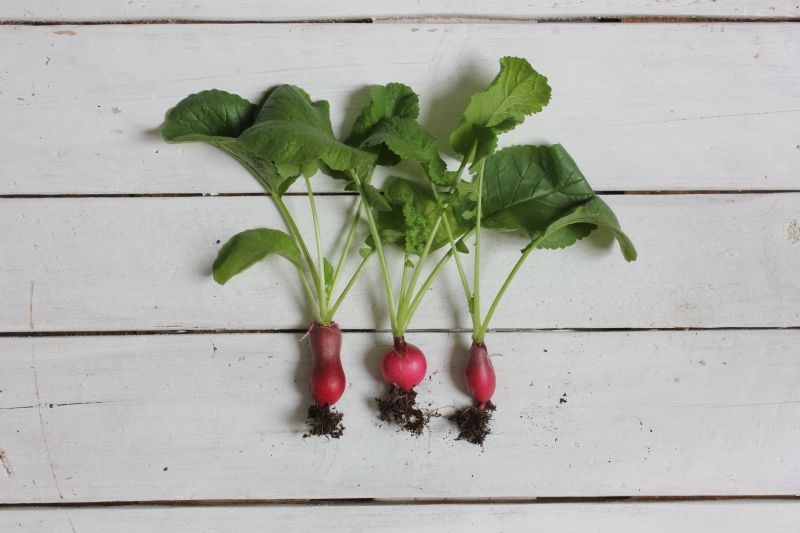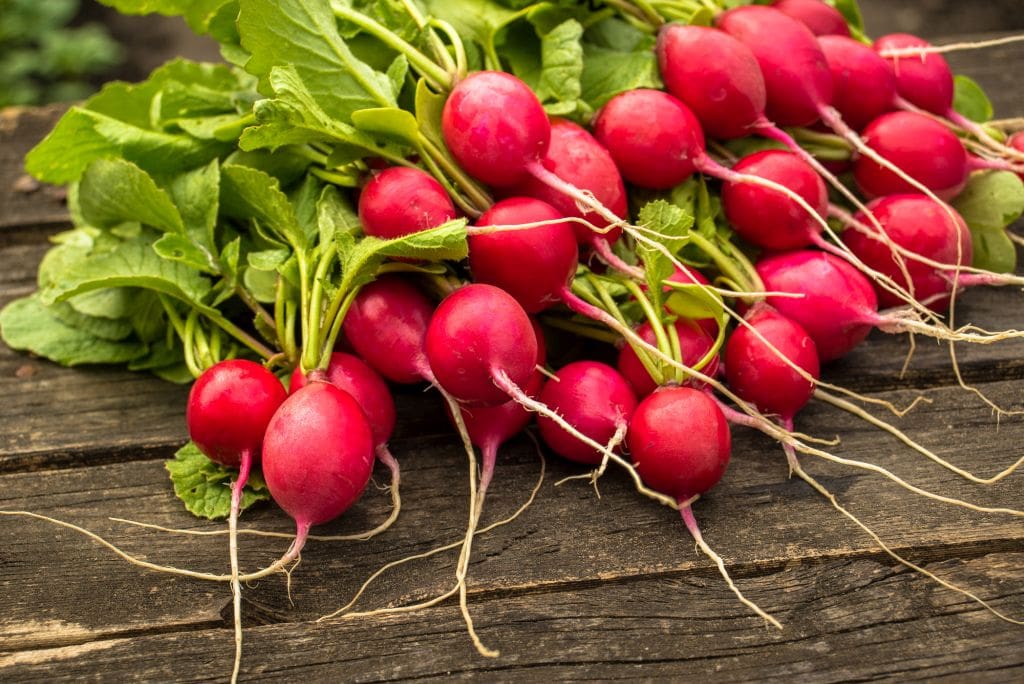How often every day are you tempted to feed your beloved dog a treat from your dinner table? It’s only natural. After all, our unique bonds with dogs likely began with the casual toss of scraps to hungry canids of ancient times.
In this current age, with the culinary advances we have made, a delightful morsel is no longer a simple tidbit. What treats can you safely give to dogs? What about healthy vegetables? Can dogs eat radishes?
The answer is not as straightforward as you would think.
Are Radishes Good for Dogs?
Dogs can safely consume radishes and may even obtain some benefits from eating a nutritious vegetable.
Nutritious Benefits of Radishes
So what, if any, nutritional benefits can your dog obtain from radishes? As an omnivore, your dog can get nutritional value from many vegetables, including radishes.
Like many veggies, radishes are high in fiber. Their unique properties are high protein levels and vitamin C. Like other vegetables, radish is a nonfatty food that has generous amounts of B vitamins like riboflavin, niacin, folate, and B6. It is also rich in manganese, magnesium, and calcium. The oils from radish even have small amounts of Omega-3 and Omega-6 fatty acids.
One of the most redeeming qualities of radishes is their phytonutrients, not usually included as essential. Red radishes have anthocyanins which improve cognitive function and have cancer-fighting and anti-inflammatory properties. Finally, radishes contain significant levels of potassium and vitamin K.

Incorporating small amounts of radishes as part of your dog’s diet has its greatest nutritional benefits through weight management. A high-fiber meal creates greater fulfillment in dogs and people. Fiber also helps regulate bowel movements in both diarrhea and constipation.
Ultimately, fiber is great for overweight dogs as it may reduce the occurrence of diabetes. Moreover, it can help in managing diabetes by stabilizing blood sugar levels.
Non-Nutritious Perks of Radishes
Chewing on the fibrous flesh of radishes can benefit your dog’s dental health. Anything that encourages your furry friend to chew will help remove plaque from his teeth.
Are Radishes Bad for Dogs?
Radish is an overall safe, nontoxic treat to give dogs.
Give In Moderation
No treat should comprise more than 10 percent of your dog’s diet. Even if you feed your canine friend a raw diet, meats should make up more than 66 percent of all meals.
Plants, radishes included, do not have all of the essential amino acids dogs need despite their relatively high protein content.
Too many vegetables will not only throw your dog’s diet off balance but could also lead him to experience severe gas. Worse, he could even become bloated and uncomfortable.
Make Diet Changes Gradually
Consult your veterinarian or nutritionist about any diet changes and make them over at least a few days.
Although it is only a change in your dog’s treats or supplements, it can make a significant difference to his digestive tract if he is used to dried liver bits.
I switched my dog to a homecooked chicken, spinach, and radish combo dish once, and he had raging diarrhea until I added some of his regular kibbles back in.
Watch for Choking Hazards
We do not recommend feeding entire radishes to dogs. Some dogs are fastidious eaters and may chew on a radish bulb for hours. Others will likely play with the spheres and perhaps wolf them down whole.
Poor Digestibility
Canids such as coyotes and foxes can obtain nutrition from plant sources in dire times when prey is scarce, unlike felids. They do not need vegetables to thrive. Therefore, a dog’s ability to digest plant material is much more limited than our own.
Among veggies, radishes are not particularly digestible for dogs.
You can help dogs digest radishes by at least slicing or chopping them. If giving a piece as a handout, digestibility may not be as crucial.
Even better than slicing is blending or pureeing the radishes or lightly boiling them. Last, you can add digestive enzymes to the food once you mix in the radish.
Can Dogs Eat Radish Greens and Leaves?

Radish greens and leaves are particularly pungent, even more so than the taproot. Unlike traditional greens, they have a heating effect on the digestive tract. Since they behave similar to spices, we recommend you avoid feeding them to your dog.
That being said, a viable alternative is radish sprouts. Soak radish seeds in water. When they germinate after about three days, you can feed a small amount of these tender shoots to your dog if he likes them.
Sprouts often have digestive enzymes and nutrient availability lacking in mature vegetables.
For dogs, you are better off feeding the root or sprouts rather than the leaves or greens.
Wild radishes, similar but unrelated to the vegetable, are toxic to dogs.
Should Dogs Eat Radishes?
Feeding radishes to dogs is a safe way to administer treats, but there are several reasons we are not enthusiastic about it as standard fare.
The nutritional value is marginal. Dogs do not require vitamin C from their food because they produce their own. This vitamin is the most well-represented in radishes.
Dental benefits are restricted for most dogs as they will not likely spend much time chewing the radish. Chews are better for dental health in dogs.
When we talk about the nutritional value of radishes, we are referring to a reference point of a cup or 116 grams of sliced vegetables.
Granted, dogs would not require nearly as much to meet a nutritional equivalent according to their size. However, the minuscule quantity we recommend and the dog’s inefficient digestion may not provide much benefit other than fiber
Many dogs do not like the distinctive taste of radishes. I can barely tolerate them on my salad.
Summary: Can Dogs Have Radishes?
They can safely eat them, and radishes can be beneficial in several scenarios. Does your dog enjoy radishes? By all means, give radish as a frozen treat. Avoid radishes in dogs who are sensitive to them.
Are you trying to get your dog to lose a few pounds, or is he a borderline diabetic? Substitute a few sprinkles of radish for some of his dog food.
Radish is an acquired taste for some dogs. It possesses less nutritional value than greens and broccoli, but it is a superior alternative to grain-based biscuits.
